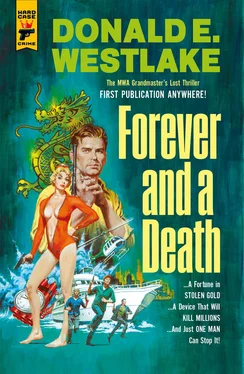Sometimes the boats belonged to Richard Curtis, a good man in Morgan Pallifer’s estimation, who occasionally needed to get around various regulations by bypassing the normal import-export routes, and when that happened, Curtis knew Morgan Pallifer was someone he could depend on, and Pallifer knew Richard Curtis had good money and good boats.
Today, Morgan Pallifer was 62, lean and leathery and mean as a snake. His faded blue eyes could almost look kindly at a distance, but they were not.
Tonight’s work was straightforward, and lucrative. Pallifer had a good power launch of Curtis’s, and a three-man crew of his own, people he could rely on. He’d done this kind of thing before, though not for Curtis, so this was a new level of their business relationship, and one that Pallifer was happy with. He would do his customary efficient job tonight, and Curtis would be pleased, and who knows what other interesting work might lie ahead? He might even have his own ship again one of these days, in waters not polluted by the Americans’ high piousness and low dealings.
They came out from Brisbane Bay after dark, and made their approach to the Mallory keeping the bigger ship to port, so the bulk of Moreton Island lay behind them, to make them just that much harder to be seen. They swung around behind the white yacht, as it sluggishly moved shoreward like some fat nun waiting for the bandits, and Pallifer, at the helm, saw the space along the starboard side of the yacht where a launch was missing.
Did the birdies fly away? Or do they want poor old Morgan Pallifer to think they flew away?
Pallifer was good with boats. He brought this launch in tight to the Mallory ’s flank without quite touching her, and behind him Arn swung the grappling hook forward and back, and in the darkness it looked like an unlit chandelier. Arn flung it high, and the curved arms of it cleared the rail up there, and at once Pallifer turned the wheel, so that the launch eased away from the white side of the yacht, making the rope more taut, out at an angle from the ship, so skinny little rope-muscled Arn could shinny up it without trouble.
Pallifer had not brought with him the ship’s plan of the Mallory that Curtis had loaned him, but he remembered the layout, and had planned accordingly. Just ahead of him on this side was the door to the storage area, for loading supplies, a plain white metal door in the ship’s white skin that was barely visible and that would be at deck level when Mallory was in port. Now, once Arn was aboard and had tossed the grappling hook back down into the sea between them for Frank to reel in, Pallifer eased the launch forward to that door. Above, Arn would be scurrying inside the ship into the main corridor, racing down the interior stairs, and then hurrying forward to the storage area. In just a minute, this door would open, and there it was, and there was Arn.
Frank and Bardo were the muscle. While Pallifer held the launch steady beside the open door, those two leaped across the moving space, holding onto the ends of ropes. Aboard, they looped the ropes around small stanchions just inside the doorway, to make the launch fast to the yacht, causing only one thump to sound when the two vessels came together. Once they were secure, Pallifer switched off the launch’s two engines and stepped aboard the Mallory .
This wasn’t his kind of ship. It was more like a country house than something seaworthy, with its carpeted stairways and expanses of glass. This wasn’t the sort of vessel Pallifer loved to sail on and craved to own.
But he wasn’t here to put an option on the Mallory , was he? No, it was a simple killing he was here for, that’s all. Two killings, to be turned into one natural death and one disappearance.
Except that the subjects weren’t where they were supposed to be. Pallifer and Arn and Frank and Bardo padded through the ship, undisturbed, knowing the crew would all be asleep and the captain obediently blind and deaf on the bridge, and when they got to cabin 4, where the disappearee was supposed to be bunked, the place was empty. No clothing, no personal possessions left behind. He’d moved out.
They went down one deck to cabin 7, where the natural death was to be waiting, and it, too was empty, but here at least the bed had been used and left mussed. And so had the bed in the cabin across the way, number 6. So the man had come down here to guard the woman, but then they’d both gone somewhere else.
Where? Off the ship? Pallifer didn’t believe it, not from Curtis’s description of the girl’s condition. No, more likely, the two of them had set loose that launch and then hidden themselves somewhere aboard the Mallory , because they’d be thinking all they were up against was some simple stupid riff-raff. They wouldn’t be expecting Morgan Pallifer.
The four men stood in the corridor between cabins 6 and 7, and Pallifer said, “All right, we’ll find them aboard somewhere, but I’d best check in first with Curtis. He wanted me to ring if there was a complication.”
They all went back up to cabin 1, which was Curtis’s when he was aboard, and where the telephone was located. Pallifer dialed the number Curtis had given him, and the man answered on the second ring; so he’d been waiting right there for the call, it was that important to him. “Yes?”
“Not in their cabins,” Pallifer said, being terse because there was no real privacy on a phone like this. “One launch is gone.”
“No,” Curtis said.
“I agree. We’ll look around.”
“Crew last.”
Of course; only disturb the crew if it was absolutely necessary. Pallifer said, “Do you suppose the captain’s been talking to them?”
There was a silence on the line, filled with electronic rustle, and then Curtis said, “I don’t think so. I think he noticed it slowed down.”
“That’s possible,” Pallifer said. “Means he’s pretty smart, though.”
“He is.”
“Should I discuss it with the captain?”
“If you think you should,” Curtis said. “But discuss it gently.”
Palliser shrugged, a little irritated. Gentle discussion never accomplished anything, “I’ll call you before we leave,” he said.
Manville moved back from the doorway to cabin 1 while the leader was still telling his men what he wanted done. The leader hadn’t believed for a second that he and Kim had fled on that launch, had he? No. A waste of time.
Manville had heard the thump of the two ships meeting, and had looked over the rail to see the last of them, the leader, as he moved from their launch into the Mallory . He’d trailed them ever since, as they went first to his cabin and then to Kim’s — Curtis had prepared them thoroughly, all right — and then back to cabin 1 for the leader to make that call.
What now? If he were alone, Manville would try to circle around them, get into an area they’d already searched, and then possibly get to their own launch and take off in it. But he also had Kim to consider, who couldn’t run, who could barely walk, and would not be able to defend herself.
What he needed was a weapon, some sort of weapon. Those four all had pistols stuck down into their belts, and at this point he had nothing. But if he could find something , and then get his hands on one of those pistols...
He’d always been a pretty good shot, against targets, never against anything alive. He’d belonged to a gun club for a few years, people who liked to plink at targets, try to compete against their own previous scores, but then the club was taken over by a group of hunters, “sportsmen” who wanted to politicize the organization and make it a mouthpiece for their own ideas, and Manville was one of those who’d dropped out. But he thought he was probably still pretty good, against something that didn’t move, and didn’t shoot back.
Читать дальше







![Дональд Уэстлейк - Enough [A Travesty (novel) and Ordo (novelette)]](/books/416846/donald-uestlejk-enough-a-travesty-novel-and-or-thumb.webp)
